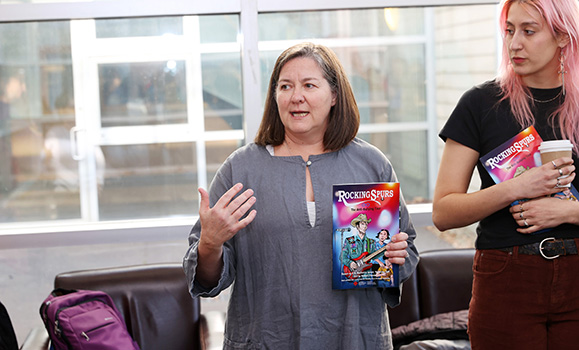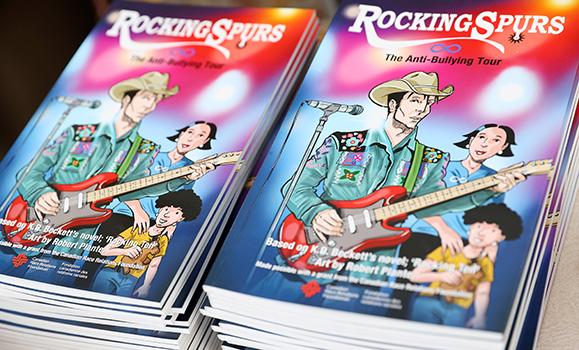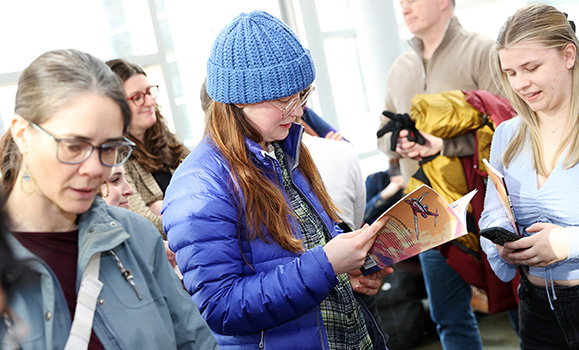A group of Dalhousie students earned credit for a history course they took last year and another kind of credit, too, as collaborators on a graphic novel that will soon land in the hands of high school students across Canada.
Rocking Spurs: The Anti-Bullying Tour was created by students in a third-year seminar on Métis Histories and Culture taught by Dr. Lisa Binkley, an assistant professor in the Department of History.
Dr. Binkley challenged the students to take what they were learning in the course about Métis identities, literature, laws, and events and integrate it into an adaptation of the novel by Métis author K.D. Beckett.
“Everybody [in the class] was involved with the creation of it,” says Dr. Binkley, who organized a gathering recently to celebrate the graphic novel’s launch.

Dr. Lisa Binkley speaks at a launch event for a graphic novel her third-year seminar class created last year based on a novel by Métis author K.D. Beckett.
Beckett’s novel follows a country-rock band called the Rocking Spurs who have an accidental encounter with a young Québec-born Innu-Métis artist and her child. The band learns that this woman has been severely bullied on social media and faces racism on a regular basis, so the band members use their fame and wealth to expose the persecutors that have been bullying this woman and other Indigenous people.
Funding from the Social Sciences and Humanities Research Council (SSHRC) New Frontiers in Research Fund (NFRF) and the Canadian Race Relations Foundation (CRRF) supported the project and enabled the class to hire award-winning graphic artist Robert Plante to illustrate and oversee the art work of the graphic novel. Now, 1,500 copies are bound for libraries in high schools across the country and will also be available for purchase locally at the .

The class worked with graphic artist Robert Plante on the illustrations.
Bringing history to the page
To bring the project to life, students were assigned different roles and responsibilities within their working groups, including leader, copy editor, publicist, and themes manager – who identified key themes to include in each chapter that related to and followed scholarly writing about the Métis people. The story addresses themes of Indigenous diversity, gender identity, and (dis)ability, and the rise of violent behaviour in Canada, bringing difficult conversations to the forefront.
Dr. Binkley says the class had an executive team to oversee social media and manage the cohesiveness of the overall project and the work done by the different teams.
“Overall, the students were fully engaged in the course content and excited about applying their knowledge of Métis Histories and Culture to the story,” says Dr. Binkley.
Hannah S. Beaulieu, who graduated last spring with a B.A. in History and is back at Dal doing a master’s degree, was in a unique position for the project.

Hannah S. Beaulieu.
“I am also Métis and both my undergrad and graduate theses are about Métis history and the course was on Métis history, so in a way I felt very immersed into the Métis culture landscape,” says Hannah, who recruited Dr. Binkley as thesis supervisor during her undergrad and again now for her graduate work. “I think having that insight really helped develop the underlying messages that we wanted to convey in the graphic novel, such as resilience and reconciliation, and community and family and all these things that really brought together the characters in the storyline.”
The novel was gifted to the class by the Chief of the Métis Nation of Canada and author K.D. Beckett, who donated all author rights and copyright to produce the graphic novel to the Métis Nation of Canada: MNOC-NMDC Inc.
The CRRF grant specifically funded a project that addressed anti-bullying and lateral violence and aimed at youth as the audience.

A creative environment
Dr. Binkley held the seminar in the Active Learning Classroom in the Marion McCain Arts and Social Sciences Building, allowing the students to work in a more creative environment.
“They could easily move their desks around the room as they needed to organize their group meetings,” she says. “And the whiteboards in the classroom helped to layout legislation, timelines, and ideas so the entire room could collaborate and build on.”
Recommended reading: Dal profs energize classroom with vibrant new student-centred redesign
Sophie Keddy, a fourth-year student who is doing a major in History and a minor in Indigenous Studies, recalls feeling daunted initially by the idea of producing such a major project within one academic term. But she said she had a great experience working and collaborating with her classmates.
“Working as a small group with some of the people in my class, I developed really good relationships with my teammates and my classmates which was nice because I find a lot of time in classes, you end up doing your own thing,” says Sophie.

Sophie Keddy.
She says part of the project involved the students working together to come up with detailed descriptions and character notes for the artist.
“Seeing it all now in book form is really, really exciting!” she says. “It’s so nice to open the book and see different things like ‘oh, we described this specific thing to the artist…and they actually put that in there!’”

